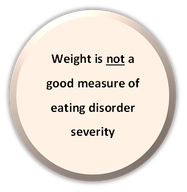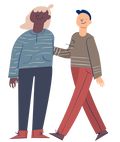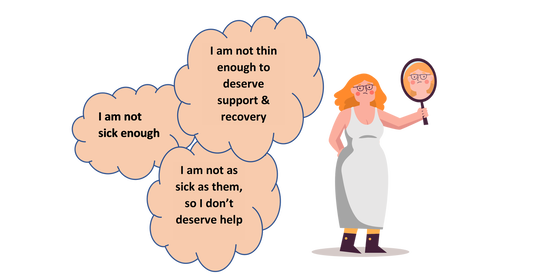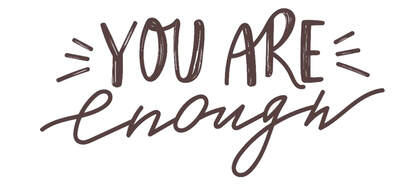|
By Kimberly Osborn, Lab Manager in the EAT lab When considering whether you should seek help for your eating disorder, do you have thoughts like: Maybe you believe that your suffering is less valid because you are not at a certain weight or don’t engage in certain behaviors. If this describes you, you are not alone!  Despite the extraordinary physical and psychological suffering caused by these deadly illnesses, many people have trouble believing their struggles are valid regardless of the severity of their eating behaviors. [1,2] These beliefs often discourage people from reaching out, which prolongs suffering and causes further physical and psychological harm. Although these thoughts are very common among people with eating disorders, research shows that weight is often not associated with the severity of a person’s eating disorder or the level of impairment they are experiencing. [3,4] The fact is that severity of your eating disorder cannot be measured simply by the number on a scale or body mass index because it is a mental disorder. This means that you cannot tell how much a person is struggling or how malnourished they are just by looking at them. Did you know that people in larger bodies can have severe and serious restrictive eating disorders? This is because weight is impacted by many factors outside of food intake and exercise behaviors, such as genetics, hormones, age, etc. In fact, most people with eating disorders are not in the “underweight” category.[5] “But I have normal lab results, so I am not “sick enough” to get help.” This is also a misconception! Lab results provide a snapshot of some aspects of your health in that moment, but they do not show the full story about the negative impacts the eating disorder has on your physical and mental functioning. Studies show that people with severe and life-threatening eating disorders can have “normal” lab results for various reasons including the person’s genetics, the type of test run, time of day, and more.[6,7] A leading eating disorder physician, Dr. Gaudiani, [6] discusses how our bodies are very skilled at trying to keep our physical functioning stable in crisis. Some people’s bodies can maintain this stability longer than others, which could produce “normal” lab results even while long term damage to the body is occurring. Additionally, even within the same person, lab results can change very drastically in a very short amount of time, meaning that your labs can go from “normal” to life-threatening within the same day. “Okay. I get that physical characteristics don’t always show the severity of my eating disorder, but my eating disorder symptoms and behaviors aren’t “as severe” as other people I know, so I don’t deserve help.  FALSE! Even if your eating disorder symptoms “could be worse”, you still deserve help! Waiting to get treatment for your eating disorder often decreases your chances for a full recovery and leads to worsening physical and mental outcomes. I once heard a therapist illustrate this concept well: “If you break a finger, you wouldn’t need to break the other nine fingers to deserve help! You would likely immediately try to fix it”. Your eating disorder is the same! At the end of the day, feeling that you are not “sick enough” to get treatment for your eating disorder is a sign that you are sick enough. People without disordered relationships with food or their bodies do not experience beliefs that being thinner or more malnourished makes you “better” at the illness or more deserving of help. These thoughts are often a part of the illness and an indication that you should reach out for help. Your experiences are valid, and you are deserving of support and recovery regardless of how much you weigh, how long you have had an eating disorder, or your medical lab results. Ready for the support and recovery you deserve? Here are some great resources: National Eating Disorders Association: https://www.nationaleatingdisorders.org/where-do-i-start-0 National Eating Disorders Association Helpline: https://www.nationaleatingdisorders.org/help-support/contact-helpline Free eating disorder support groups: https://anad.org/ Eating Disorder Hope’s Treatment Finder: https://www.eatingdisorderhope.com/ Association for Size Diversity and Health: https://asdah.org/ The Food Psych Podcast by Christy Harrison: https://christyharrison.com/foodpsych References
[1] Eiring, K., Wiig Hage, T., & Reas, D. L. (2021). Exploring the experience of being viewed as “not sick enough”: A qualitative study of women recovered from anorexia nervosa or atypical anorexia nervosa. Journal of Eating Disorders, 9(1), 1-10. https://doi.org/10.1186/s40337-021-00495-5 [2] LaMarre, A., & Rice, C. (2016). Normal eating is counter‐cultural: Embodied experiences of eating disorder recovery. Journal of community & applied social psychology, 26(2), 136-149. https://doi org/10.1002/casp.2240 Gaudiani, J. L. (2018). Sick enough: A guide to the medical complications of eating disorders. Routledge. [3] Machado, P. P., Grilo, C. M., & Crosby, R. D. (2017). Evaluation of the DSM‐5 severity indicator for anorexia nervosa. European Eating Disorders Review, 25(3), 221-223. https://doi.org/10.1002/erv.2508 [4] Smith, K. E., Ellison, J. M., Crosby, R. D., Engel, S. G., Mitchell, J. E., Crow, S. J., ... & Wonderlich, S. A. (2017). The validity of DSM‐5 severity specifiers for anorexia nervosa, bulimia nervosa, and binge‐eating disorder. International Journal of Eating Disorders, 50(9), 1109-1113. https://doi.org/10.1002/eat.22739 [5 National Eating Disorders Association. (2022). Eating Disorder Myths. Retrieved from https://www.nationaleatingdisorders.org/toolkit/parent-toolkit/eating-disorder-myths.] [6] Gentile, M. G., Manna, G. M., Pastorelli, P., & Oltolini, A. (2011). Laboratory evaluation in pa tients with anorexia nervosa: Usefulness and limits. La Clinica Terapeutica, 162(5), 401-407. [7] Gaudiani, J. L. (2018). Sick enough: A guide to the medical complications of eating disorders. Routledge. [8] Photo “You are enough” Retrieved from [CoCoart_ua]/Adobe Stock. [9] Photos of people Retrieved from SlidesGo.
0 Comments
Leave a Reply. |
Archives
January 2024
Categories |
- About
- People
- Our Research & Publications
-
Participate in Research
- Personalized Interventions and Outcomes: Navigating Eating Disorder Experiences and Recovery (PIONEER) Study (Online)
- Youth Eating Study (YES!)
- Tracking Restriction, Affect and Cognitions (TRAC) Study (Online)
- Virtual Reality Study
- Facing Eating Disorder Fears Study (Online)
- Personalized Treatment and CBT-E Study (Online)
- Body Project Summer Camp
- The Body Project
- Clinical Screener Study (Online)
- Clinic, Supervision, and Consultation
- Blog & In the Press
-
Archived Studies
- Predicting Recovery Study (Online)
- Online Single Session Resources
- Reconnecting to Internal Sensations and Experiences (RISE) Study
- Web-Based Mindfulness Study
- Personalized Treatment Study
- Online Imaginal Exposure Study
- In-Vivo Imaginal Exposure Study
- Daily Habits 3 Study
- Daily Mood Study
- COVID-19 Daily Impact Study
- Conquering fear foods study
- Louisville Pregnancy Study
- Approach and Avoidance in AN (AAA) Study
- Web-Based Mindfulness for AN & BN Study
- Barriers to Treatment Access (BTA) Study!
- Mindful Self-Compassion Study
- Network EMA Study
- Legacy of Hope Summit Report
- DONATE-CURE EATING DISORDERS!
- Directions
- Statistical Consultation
- About
- People
- Our Research & Publications
-
Participate in Research
- Personalized Interventions and Outcomes: Navigating Eating Disorder Experiences and Recovery (PIONEER) Study (Online)
- Youth Eating Study (YES!)
- Tracking Restriction, Affect and Cognitions (TRAC) Study (Online)
- Virtual Reality Study
- Facing Eating Disorder Fears Study (Online)
- Personalized Treatment and CBT-E Study (Online)
- Body Project Summer Camp
- The Body Project
- Clinical Screener Study (Online)
- Clinic, Supervision, and Consultation
- Blog & In the Press
-
Archived Studies
- Predicting Recovery Study (Online)
- Online Single Session Resources
- Reconnecting to Internal Sensations and Experiences (RISE) Study
- Web-Based Mindfulness Study
- Personalized Treatment Study
- Online Imaginal Exposure Study
- In-Vivo Imaginal Exposure Study
- Daily Habits 3 Study
- Daily Mood Study
- COVID-19 Daily Impact Study
- Conquering fear foods study
- Louisville Pregnancy Study
- Approach and Avoidance in AN (AAA) Study
- Web-Based Mindfulness for AN & BN Study
- Barriers to Treatment Access (BTA) Study!
- Mindful Self-Compassion Study
- Network EMA Study
- Legacy of Hope Summit Report
- DONATE-CURE EATING DISORDERS!
- Directions
- Statistical Consultation



 RSS Feed
RSS Feed
